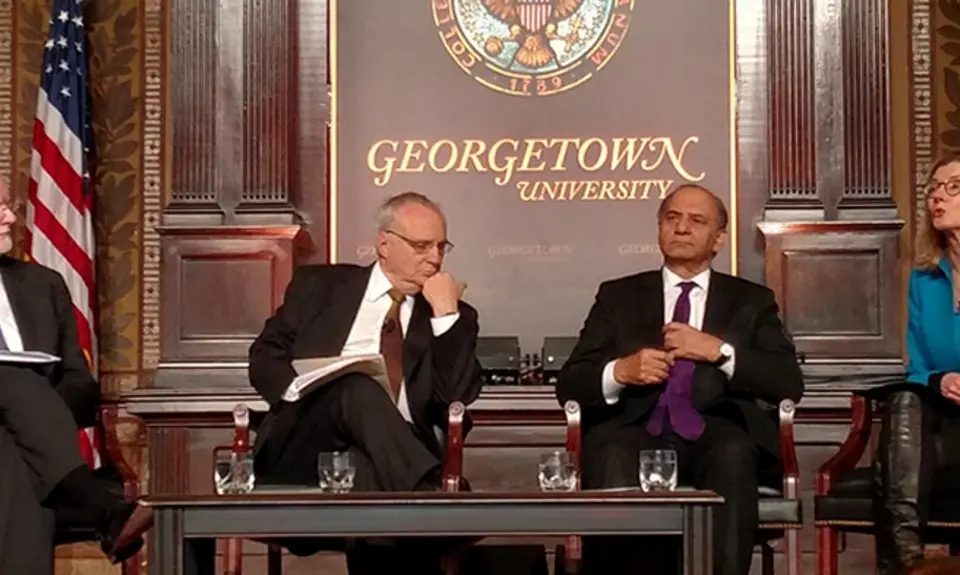The rise in religious intolerance in the U.S. undermines the ability of the U.S. to advocate for human rights and other democratic values overseas, according to experts in religion and diplomacy who took part in a March 22 discussion sponsored by Georgetown University’s Institute for the Study of Diplomacy.
Rabbi David Saperstein, People For the American Way Foundation board member and former U.S. Ambassador-at-Large for International Religious Freedom, was among the panelists. Saperstein said that principles contained in the U.S. Constitution—no religious test for public office, no establishment of religion, protection of free exercise of religion—represent an ideal that captures the imagination of people around the world, including religious minorities who are facing brutal persecution.
But, Saperstein said, the pushback he heard as a diplomat from political and religious leaders challenging the moral authority of the U.S. to speak on these issues “intensified with the start of Donald Trump’s presidential campaign” and Trump’s inflammatory rhetoric against immigrants, Muslims, and others.
Joel Hellman, dean of Georgetown’s School of Foreign Service, warned against “the normalization of ethno-nationalism that denies the very notion of pluralism and diversity.” He said such normalization, or “tolerance of intolerance,” can corrode our democracy, damage our standing internationally, and make us more vulnerable to our adversaries.
That point was affirmed by Barbara Bodine, a former U.S. Ambassador and current director of the Institute for the Study of Diplomacy. Bodine said that American ideals of pluralism and tolerance must be protected by citizens, civil society, and public officials with “unflagging vigilance.”
“When we fail at this responsibility,” said Bodine, “when we wrap ourselves in the flag of ethno-nationalism or nativism, when we offer easy propaganda to terrorist groups like ISIS and others who are willing to use our hypocrisy against us, we diminish ourselves, and we undercut our global role and our capacity to be champions of human rights.”
Shaun Casey, director of Georgetown’s Berkley Center for Religion, Peace & World Affairs and a former director of the State Department’s Office of Religion and Global Affairs, agreed, saying “clearly we have paid a price internationally” in terms of authority and prestige with the rise of populism and religious bigotry in the U.S.
Farooq Kathwari, CEO of Ethan Allen and co-chair of the Muslim-Jewish Advisory Council, warned that the rise of anti-Muslim bigotry in the U.S. is used as a recruiting tool by terrorists.
Casey suggested one important avenue of research for those in higher education is the extent to which people involved in the alt-right or “new populism” are being “animated and fed and drawing political and moral moorings” from their Christian beliefs and institutions. To that point, the Washington Post reported on Monday on new research showing that Christian nationalist ideology and antagonism toward Muslims are the strongest predictors of support for Trump.
Saperstein said that, without minimizing the corrosive impact of religious leaders who do promote xenophobia and religious or racial supremacy, he wanted to note that it is also a daily reality in the U.S. that people of varied religious traditions are working together to solve problems and stand together against hatred.
Casey agreed, citing new kinds of collaboration among religious groups involved in refugee resettlement. But, he said, with the Trump administration ratcheting down refugee admissions, many of the religious groups that have been involved in resettlement are laying off staff. Casey said he believes that there are governmental and political forces that do not want interfaith cooperation to grow.
Saperstein cited a number of social justice movements in which progress depended not only on multi-ethnic and multi-religious coalitions, but also on a “bipartisan coalition of decency on Capitol Hill.” That kind of cooperation is more difficult, he said, given the intense partisanship in our national politics.
The Georgetown event took place just two days before the March for Our Lives and its focus on the leadership being exercised by young people. Casey also looked to younger generations for hope. He said that “the lived experience of American pluralism” that he sees in his daughter’s public school classrooms and on her soccer team are a source of resilience for the country’s long-term commitment to the values that are currently under attack by divisive political and religious leaders.
Georgetown (in full disclosure, my alma mater) is a Catholic and Jesuit university with a multicultural student body. GU President John DeGioia also spoke at the ISD event, which included responses to the panel presentation from the university’s Director for Jewish Life Rabbi Rachel Gartner and Muslim Chaplain Imam Yahya Hendi.
